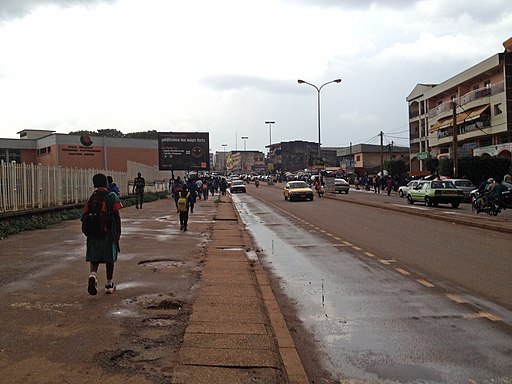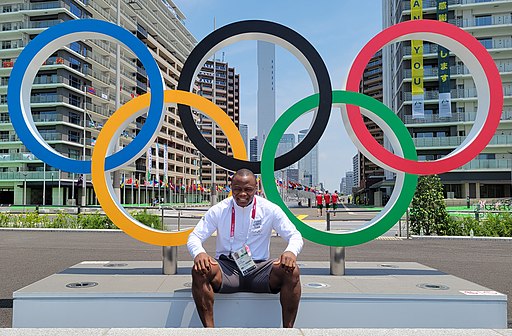Cyrille Tchatchet (26) is a weightlifter representing England this summer at the Commonwealth Games in the 96kg category. However, his journey to squad selection is not the typical athlete’s tale. Eight years ago, Tchatchet’s life was very different…
Difficult Beginnings
Tchatchet was born in Yaounde – the second largest city in Cameroon – where his family struggled to get by. As one of six children raised by his single mother in impoverished conditions, Cyrille did not have an easy start to life. Their mother had very little money and the children were frequently dismissed from school for not paying their fees.
 Road to school in Yaounde Bdx, CC BY-SA 4.0
Road to school in Yaounde Bdx, CC BY-SA 4.0 It was at 14 years of age that Cyrille found solace and his sport. Stumbling upon a photo of his uncle weightlifting, the youngster was immediately intrigued. His mum then put him in touch with his cousin’s cousin who was also into the sport. Tchachet recalls, “I saw the picture on Saturday, and I started weightlifting that Monday.” But little did he know how far it would take him.
The Great Escape
In 2014, Cyrille Tchatchet represented Cameroon in the Glasgow Commonwealth Games where he secured fifth place. While the first time on the global stage might be a highlight for any young athlete, Cyrille was in a difficult position. Back home, things were making a turn for the worse. The conflict between the Cameroonian government and the Islamist group Boko Haram has killed thousands of Cameroonians since 2014. Too afraid to return home, the 19-year-old ran away from his team’s base in Glasgow and headed for Brighton.
Living under a bridge, Cyrille struggled to survive. He had very little money and recalls somehow managing to sustain himself on supermarket biscuits. During this time, his mental health reached its lowest point and Cyrille contemplated suicide as an escape. He couldn’t imagine how his life could improve from here. But, in his darkest moments, Tchachet saw a phone number for the Samaritans helpline, and he reached out. After several life-threatening months living on the street and barely surviving, this was the phone call that changed his life. Two police cars pulled up to collect him and Cyrille’s asylum case to stay in the UK began.

The Road to Security
Naturally, Cyrille was afraid when the police took him in. He feared being deported or receiving brutal treatment reminiscent of his experiences back home. However, the police officers brought Cyrille to an immigration office where he received help to apply for asylum. He spent some time in two immigration removal centres (otherwise known as immigration detention centres) in Dover and then London. He was then rehoused in a refugee hostel in Birmingham. During this time, his mental health suffered immensely but despite the darkness he felt, he was supported by a compassionate team of professionals. After two long years, Cyrille was granted his leave to remain status, allowing him to live in the UK.
“Birmingham saw me in my darkest times and it’s only fair for Birmingham to see me on that podium.”
It’s certainly an exciting prospect for Tchatchet to participate in the Birmingham Games. As the West Midlands is now his home, these “local games” will be a chance for him to represent not only the country, but also the region and his new community.
Refugee Representative
Cyrille Tchachet, like several others, received a scholarship from the International Olympic Committee (IOC). This gave him the support and funding to progress in his career despite his difficult situation, and to finally compete again in a top international event. So, in 2020, Tchatchet competed for the IOC Refugee Olympic Team at the Olympic Games in Tokyo. Founded in 2015, the Refugee Olympic Team aims to send a message of hope and solidarity as well as strengthening the support for refugees worldwide. Being selected for the Tokyo Games was a huge achievement for Tchachet. The young weightlifter expressed that he was not only representing refugees but also the then-estimated 80 million displaced people around the world.
“Refugees are normal people with dreams and ambitions and can compete at the highest level.”
Tchatchet is not only a refugee representative on the sporting stage but also a high-profile supporter of UNHCR (the UN Refugee Agency). He has spoken out on behalf of the agency about the reality refugees face in today’s world. As an advocate for bettering the lives of refugees, Tchatchet continues to challenge the “racism, xenophobia, misunderstanding, and toxic narratives” they face.
 Ct732, CC BY-SA 4.0
Ct732, CC BY-SA 4.0 Brains as well as Brawn
Cyrille Tchachet is not all muscles, he’s also got brains. In 2019, he graduated from Middlesex University with a degree in Nursing (Mental Health). As well as a world class sportsman, Tchachet is a senior practitioner on a community mental health team. Working for the NHS in Walsall, near Birmingham. Following a move back to the West-Midlands after starting his nursing career in Harrow. After fighting his own mental health battles, Cyrille now helps others who are struggling with theirs. He says,
As a nurse, he is doing exactly that. Cyrille brings compassion to this role, but also promotes the idea that getting help is not a sign of weakness. He believes it’s important that patients can talk openly without being judged. With his colleagues describing him as an inspiration, it’s exciting to see what else Cyrille will go on to achieve.
 Walsall Manor Hospital Riz007, CC BY-SA 4.0
Walsall Manor Hospital Riz007, CC BY-SA 4.0 A Lesson to Learn
Seeking asylum is a universal human right. The UNHCR works to improve the lives of displaced people across the globe and combat the prejudices that surround them. Unfortunately, in the UK, refugees and asylum seekers are stigmatised; it is not helped by our government with the likes of the ‘Anti-Refugee Bill’. But, the truth is, refugees are not here to steal our jobs or our benefits. Cyrille is the perfect example of this. He was in a life-threatening position and sought out safety in the UK. Now, he is giving back to the community that saved his life.
What’s important to take away from Cyrille’s story is that his trauma didn’t stop him. He was given an opportunity and he took it with both hands. Unfortunately, many asylum seekers and refugees in the UK are never given a real chance to flourish. This needs to change; Cyrille is right:
“What they need is the opportunity to be given for them to thrive.”
